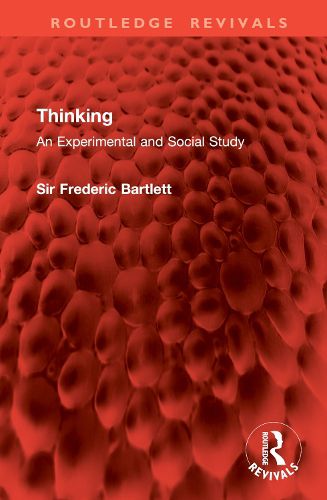Readings Newsletter
Become a Readings Member to make your shopping experience even easier.
Sign in or sign up for free!
You’re not far away from qualifying for FREE standard shipping within Australia
You’ve qualified for FREE standard shipping within Australia
The cart is loading…






First Published in 1958, Thinking Introduces a number of simple experiments which can all be repeated by anybody who is interested. They show that the thinker is all the time trying to fill up gaps in information that is available to him in such a manner that there is a good prospect that all other thinkers, given the same incomplete information, will agree with him. How, and what are the conditions, under which he does this, are considered and illustrated a) for formal thinking; b) for the thinking of the experimental scientist; c) for everyday thinking, and d) for the thinking of the artist.
A great many of the processes used in thinking have been developed at a level of bodily skill, and long before thinking proper becomes possible at all. At the same time, it becomes clear, as the investigation proceeds, that thinking processes have important characteristics and rules peculiar to themselves. These also vary according to the fields of information in which the thinker operates. There is no doubt that Sir Frederick's experimental study is a work of first importance and will be useful for scholars and researchers of psychology.
$9.00 standard shipping within Australia
FREE standard shipping within Australia for orders over $100.00
Express & International shipping calculated at checkout
Stock availability can be subject to change without notice. We recommend calling the shop or contacting our online team to check availability of low stock items. Please see our Shopping Online page for more details.
First Published in 1958, Thinking Introduces a number of simple experiments which can all be repeated by anybody who is interested. They show that the thinker is all the time trying to fill up gaps in information that is available to him in such a manner that there is a good prospect that all other thinkers, given the same incomplete information, will agree with him. How, and what are the conditions, under which he does this, are considered and illustrated a) for formal thinking; b) for the thinking of the experimental scientist; c) for everyday thinking, and d) for the thinking of the artist.
A great many of the processes used in thinking have been developed at a level of bodily skill, and long before thinking proper becomes possible at all. At the same time, it becomes clear, as the investigation proceeds, that thinking processes have important characteristics and rules peculiar to themselves. These also vary according to the fields of information in which the thinker operates. There is no doubt that Sir Frederick's experimental study is a work of first importance and will be useful for scholars and researchers of psychology.